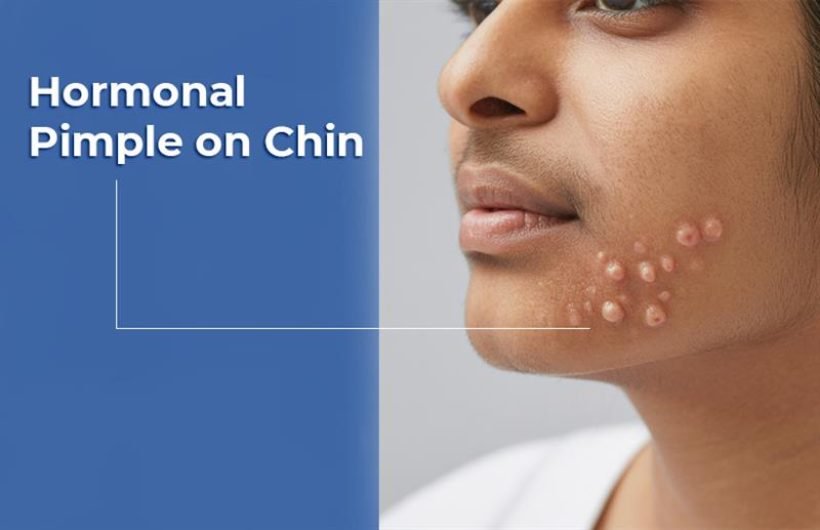Pimples are frustrating at any age, but when they repeatedly show up on your chin, it often points to something deeper hormones. A hormonal pimple on the chin is not just a random skin issue. It is closely linked to fluctuations in your body’s hormones, especially during periods, stress, or medical conditions like PCOS. That’s why many people notice a sudden breakout on their chin right before or during their menstrual cycle. Understanding the root cause of chin acne can help you manage it more effectively.
In this blog, we’ll explore why these pimples appear, how you can prevent them, and the best hormonal pimple treatment options available.
Causes of Hormonal Pimples on the Chin
1. Hormonal Fluctuations During Menstrual Cycle
For many women, chin acne gets worse just before their period. This is often called a period pimple on the chin. During this time, estrogen and progesterone levels rise and fall, leading to increased oil production. This excess oil clogs pores, resulting in painful pimples that commonly appear on the lower face, particularly the chin and jawline.
2. Excess Sebum Production and Clogged Pores
Shifts in hormone levels can stimulate the skin’s sebaceous glands to ramp up oil (sebum) production. When sebum is mixed with dirt and dead skin cells, pores get blocked, creating the perfect environment for acne-causing bacteria to grow. This often leads to inflamed, red, and painful pimples on the chin.
3. Lifestyle Factors
Your everyday habits play a major role in skin health. Eating foods high in sugar, dairy, or processed items can worsen acne. Stress can raise cortisol levels, which may lead to increased oil production and trigger breakouts. Lack of sleep further disrupts hormonal balance, making the skin more prone to hormonal pimples on the chin.
4. Medical Conditions
Sometimes, recurrent chin pimples are a sign of underlying medical conditions. Polycystic Ovary Syndrome (PCOS), thyroid imbalance, and other hormonal disorders can trigger stubborn chin acne. In such cases, treating the root medical condition is as important as addressing the pimples themselves.
Prevention Tips for Hormonal Chin Pimples
While you can’t completely control your hormones, simple lifestyle and skincare changes can help reduce the frequency and severity of pimples.
1. Follow a Gentle Skincare Routine
- Wash your face twice a day using a gentle cleanser that won’t clog pores.
- Steer clear of abrasive exfoliants that can damage the skin’s surface and trigger more breakouts.
- Choose non-comedogenic moisturisers and sunscreens that are oil-free and specially formulated for acne-prone skin.
2. Maintain a Balanced Diet
- Reduce sugar and refined carbs, which can spike insulin and worsen acne.
- Include fresh fruits, vegetables, whole grains, and omega-3-rich foods like walnuts and fish.
- Limit dairy intake if you notice frequent period pimples on chin after consuming milk or cheese.
3. Stay Hydrated and Manage Stress
Drinking enough water helps flush out toxins and keeps your skin hydrated. Along with that, practising yoga, meditation, or even simple breathing exercises can help reduce stress hormones that aggravate acne.
4. Get Adequate Sleep
Aim for 7–8 hours of restful sleep daily. Poor sleep affects hormone regulation and can trigger acne breakouts.
5. Know When to Visit a Doctor
If you’re dealing with painful, recurrent hormonal pimples on chin, it’s time to consult a specialist. Persistent acne may need medical evaluation to rule out conditions like PCOS or thyroid imbalance.
Hormonal Pimple Treatment
If prevention strategies aren’t enough, don’t worry, there are effective treatment options available.
1. Over-the-Counter (OTC) Treatments
- Formulas with salicylic acid or benzoyl peroxide can help clear clogged pores and calm inflamed skin.
- Retinol-based creams encourage faster skin cell turnover, preventing clogged pores.
2. Professional Treatments
For stubborn and recurring chin acne, professional hormonal pimple treatment may be necessary:
- Chemical Peels – These helps exfoliate the skin and reduce oil buildup.
- Laser Therapy – Targets deep acne and reduces scars.
- Prescription Medicines – Medical providers may prescribe oral contraceptives, antibiotics, or anti-androgen medications to regulate hormones and control acne.
3. Natural Remedies (With Caution)
Some people find relief using natural remedies like:
- Aloe Vera – Soothes inflammation and redness.
- Tea Tree Oil – Has antibacterial properties but must be diluted before applying to avoid irritation.
Remember, while home remedies may provide temporary relief, they are not a replacement for professional hormonal pimple treatment.
Conclusion
A hormonal pimple on the chin is more than just a surface-level issue. It reflects the changes happening inside your body, whether due to periods, stress, or medical conditions like PCOS. By following a consistent skincare routine, eating a balanced diet, managing stress, and getting enough sleep, you can prevent many breakouts.
However, if your pimples are painful, persistent, or affect your confidence, don’t hesitate to seek expert help. A healthcare provider can provide the right hormonal pimple treatment to target the root cause and give you clearer, healthier skin.
If you’re struggling with hormonal pimples on your chin, consult an Endocrinologist Specialist for personalised treatment.






